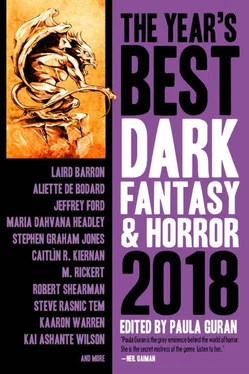“Seven times seven,” DeMains said. “It’s an important one.” He tilted his head and stared sympathetically into Sir Henry’s eyes. “You will need a special gift. One that entails a sacrifice.” He glanced at the skull cradled in his hands. “She would do nicely.”
Sir Henry pursed his lips. “It’s not fair,” he said, “for my birthday to interrupt what could be a lovely relationship.”
“Life isn’t fair,” DeMains replied. “Regardless, the people expect it. With great tracts of land comes great responsibility. Remember what happened to your father.”
“That occurred before I was born,” Sir Henry stated as he frowned. “And I believe a good part of the tale was fabricated by fishwives eager for scandal.”
But DeMains shook his head. “Belief does not change your responsibility, especially in the eyes of the villagers. We don’t want outsiders involved, or the police, and local girls won’t do. Times have changed. It’s an elegant solution.”
“Quite.” Sir Henry took his hands out of his pockets and tapped his cane on the floor, his lips pouting. “It’s still not fair,” he said, “but I suppose you’re right.” He turned to go, then paused at the door. “Spare no expense,” he said. “And call me when you give her eyes.”
One week later, Sir Henry stood on the cliff edge and stared down at the moaning, ever-hungry sea. In his hand was an unopened bottle of cognac. Sea-fret blew into his face as the incoming tide boomed and crashed, eating away at the rock beneath his feet. It was only a matter of time before the cliff face tumbled into the depths, and with it, a little more of Sir Henry’s heritage. But that was what it meant to be an aristocrat in these parts. To hold on to what you could, however you could, sacrificing whatever was necessary. It was rarely a pretty business.
Turning his back to the wind, which was redolent with brine and seaweed, Sir Henry strode to the most ancient part of the old abbey. Tucking the cognac under his arm, he removed a rusted iron key from the vast ring he’d hooked to his belt and unlocked the stout oak door that led to the catacombs. Once inside, he lifted the waiting torch from its iron sconce and reached into his coat for his silver pocket lamp. With the ease of long practice, he pressed the side button to pop the lid, and a second time to ignite the cap. The fluid-drenched wick caught with a crack and a hiss. Sir Henry stared at the yellow flame as it engulfed the torch’s pitch-soaked head. It stank, but his nose no longer crinkled with distaste. After so many decades of traveling these lightless tunnels, he was used to it.
Shadows lurked around each corner and the dark spill behind every pebble and stone stretched long and ominous, like poisonous little secrets. Here in this underground place every sound was distorted. His footsteps echoed like the pounding of the sea in the caves below, and the very blood in his veins pulsed like a tide.
Soon he came to the shelves which housed his father’s collection. He paused for a moment, letting the firelight play across a delicate crown of bone, the elegant arch of a brow, or plumb the lovely mystery of an eye socket. These were his first darlings, his earliest fantasies. As a boy, he had come down and played with them. In his imagination, he’d dressed them in exquisite flesh, though secretly he’d thought, even then, that bone was best—the very foundation of feminine splendor. In fact, he never found a woman so truly beautiful as one he had seen fully disrobed, one whose face he had been able to rebuild at his pleasure.
Placing his torch in a nearby sconce and setting the bottle at his feet, he reached to the highest shelf and grasped a bony visage by its hollows. He cradled it in his hands, as if it were the most precious jewel. His father had etched a name on every head in his harem, but this one had always been Henry’s favorite. Lady Godiva—the woman who had ridden naked through a town, dressed only in her long, luxuriant hair. To her, bareness would be second nature. He kissed her serene, bony brow and tucked her under his arm. Picking up the bottle at his feet, he began to walk deeper into the catacombs. Despite his vows, the abbot always appreciated female company.
By flickering torchlight, Sir Henry journeyed deeper into the catacombs’ twisting intestines. Veins of sea-green malachite and foam-colored quartz caught the light like phosphorescent algae. Long ago, before Christianity had been dreamed of, these tunnels were hollowed out by Stone Age miners who used the crystals in the strange rites they performed in honor of their sea gods, and later by men hungry for copper ore. Sir Henry paused near an ancient stone altar scattered with votive offerings of bone. Not even those Bronze Age innovators—mining for copper and trading for tin—could forget about the Old Ones of the sea. Clutching the skull more tightly, Sir Henry hurried on, suddenly eager for company.
Compared to the narrow, twisting tunnels used to reach it, the abbot’s cell was palatial. A natural cavern, it had been painstakingly carved into fan arches, though instead of columns, the walls were adorned with glistening stalagmites and stalactites that made Sir Henry think of cascades of glittering seafoam.
After lighting the cell’s seven torches, Sir Henry set his own torch in an eighth ornate sconce. The light flickered eerily across wall frescoes depicting the abbot’s martyrdom. Images of the man being hanged, drawn, quartered, and burned shimmered in the torchlight. His scorched bones now lay in an oak chest bound with gold, which rested in a niche cut into the granite wall.
Sir Henry placed the skull on the stone slab that served as a table and then sat on a nearby boulder. “I’ve brought company,” he said as he poured cognac into three waiting glasses.
A shadow unfolded itself from the oaken box and drifted toward the table. It had the rough dimensions of a man. Sir Henry knew from experience that the longer he stayed and the more he drank, the more manlike the shadow would become. Whether that was due to the abbot’s memory returning or merely to the effect of the alcohol, he had no idea. But he supposed that, either way, the abbot’s lack of distinct form was hardly surprising. He doubted he’d remember his own face after five hundred years of dust.
“To Beauty,” Sir Henry cried as he stood and raised his glass to Lady Godiva’s pale, bony visage. The Shadow raised the shadow of its glass in an equally enthusiastic toast, and the two—man and shadow—drank. Sir Henry swished the cognac around his mouth and felt the dull heat course through his body. It helped to disperse the chill of these ancient sea caves. He took a deep breath, since he wasn’t certain how to phrase his next question. In the end, he decided that bluntness was best.
“My dear Abbot,” he said finally, “may I borrow your treatise on the transmutation of base clay into flesh?” He could feel his companion’s surprise. After all, that treatise had sealed the abbot’s unhappy fate. “You see,” Sir Henry continued, “it’s my forty-ninth birthday soon. Seven times seven, on Midsummer Night.”
Sir Henry thought he saw the shadow give a quick nod of understanding, and perhaps of sympathy. Slowly, it rose and drifted to a far corner of the room, directly below the section of the fresco that depicted his hanged body being pulled in four directions by galloping horses. Only in this image, the horses were sea horses, like mad kelpies charging through seafoam.
The abbot pointed to a foundation stone which, at some point in the past, had been loosened. Sir Henry’s knees cracked as he knelt down and dragged the heavy stone out of the wall. Just as he’d thought: a hiding place. Slowly and carefully, he inserted his hand and then his forearm. Sifting through dirt and dust, he combed his fingers through every inch of the enclosed space. He soon realized that the hole was much deeper than he’d expected and had to thrust the rest of his upper arm into the hollow before his fingers brushed against what felt like a roll of parchment. Grunting, he pressed his shoulder against the wall and reached in as deep as he could. With a husky cry of triumph, he grasped the manuscript and withdrew it from its centuries-old hiding place.
Читать дальше












